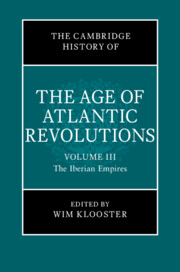Book contents
- The Cambridge History of the Age of Atlantic Revolutions
- The Cambridge History of the Age of Atlantic Revolutions
- The Cambridge History of the Age of Atlantic Revolutions
- Copyright page
- Contents
- Figures
- Maps
- Tables
- Contributors to Volume III
- Preface
- Introduction
- Part I The Spanish Empire
- Part II Brazil, Portugal, and Africa
- 16 Overview: The Independence Era in the Luso-Brazilian World
- 17 Portugal’s Social and Political Change from the Ancien Régime to Liberalism
- 18 Conservative Tracks toward Independence: Transfer of the Court to Rio de Janeiro, the Porto Revolution, and Brazilian Autonomy
- 19 Building New Brazilian Institutions
- 20 Slaves, Indians, and the “Classes of Color”: Popular Participation in Brazilian Independence
- 21 Brazil and the Independence of Spanish America: Parallel Trajectories, Linked Processes (1807–1825)
- 22 Waves of Sedition across the Atlantic: Liberal Politics in Angola in the Wake of Brazilian Independence (c. 1817–1825)
- Index
19 - Building New Brazilian Institutions
from Part II - Brazil, Portugal, and Africa
Published online by Cambridge University Press: 20 October 2023
- The Cambridge History of the Age of Atlantic Revolutions
- The Cambridge History of the Age of Atlantic Revolutions
- The Cambridge History of the Age of Atlantic Revolutions
- Copyright page
- Contents
- Figures
- Maps
- Tables
- Contributors to Volume III
- Preface
- Introduction
- Part I The Spanish Empire
- Part II Brazil, Portugal, and Africa
- 16 Overview: The Independence Era in the Luso-Brazilian World
- 17 Portugal’s Social and Political Change from the Ancien Régime to Liberalism
- 18 Conservative Tracks toward Independence: Transfer of the Court to Rio de Janeiro, the Porto Revolution, and Brazilian Autonomy
- 19 Building New Brazilian Institutions
- 20 Slaves, Indians, and the “Classes of Color”: Popular Participation in Brazilian Independence
- 21 Brazil and the Independence of Spanish America: Parallel Trajectories, Linked Processes (1807–1825)
- 22 Waves of Sedition across the Atlantic: Liberal Politics in Angola in the Wake of Brazilian Independence (c. 1817–1825)
- Index
Summary
This chapter synthesizes the history of the monarchy in Brazil from the Portuguese court’s 1807 exile to Rio de Janeiro to the end of the Regency in 1840. It addresses the European threats to the Portuguese monarchy, its successes in Brazil, and its adaptation to the Atlantic revolutionary era. It focuses on the actions of two monarchs, João VI and Pedro, João’s heir in both the old Portuguese kingdom and the new Brazilian one, which Pedro made independent and transformed into the Empire of Brazil, in 1822. It goes on to discuss Pedro I’s struggle (1822-1831) for domination against the Brazilian elite, and the results, through the Regency (1831-1840) following Pedro I’s abdication. Of particular significance in all of this are international and social issues bound up with the continued expansion of African slavery and its Atlantic trade. In both the diplomacy between João VI and his crucial English allies, the abolition of that trade loomed large. It was central, too, in the struggles between Pedro I and his parliamentary opposition. Indeed, slavery’s maintenance as foundational to the economy, the society, and those who dominated both, as well as the state, is made clear in analyzing the monarchy’s politics during 1822-1840. Slavery affected the monarchy’s survival, transformation, and the nature of party formation and ideology in the constitutional monarchy that emerged by 1840.
Keywords
- Type
- Chapter
- Information
- The Cambridge History of the Age of Atlantic Revolutions , pp. 496 - 519Publisher: Cambridge University PressPrint publication year: 2023

